Paper Menu >>
Journal Menu >>
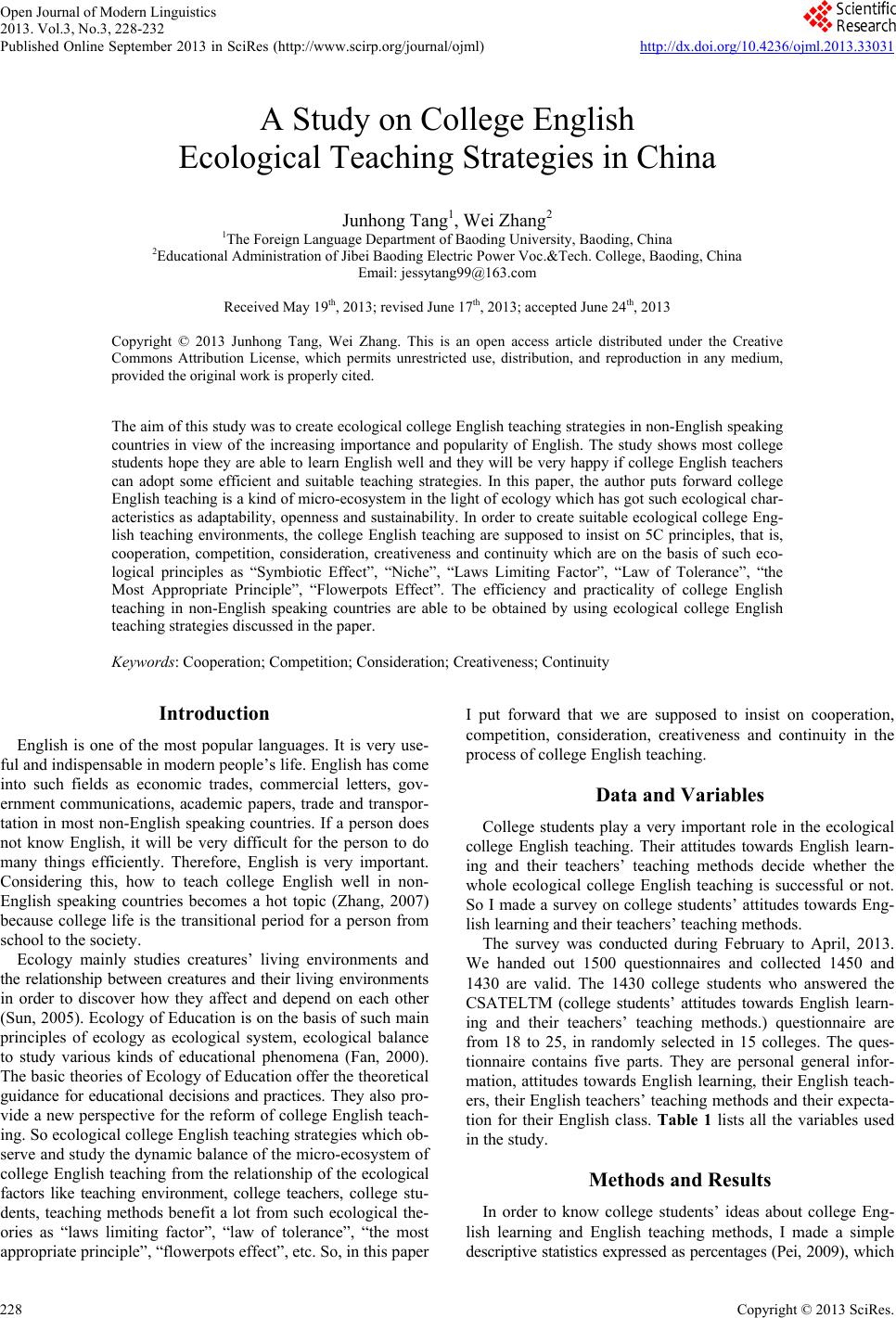 Open Journal of Modern Linguistics 2013. Vol.3, No.3, 228-232 Published Online September 2013 in SciRes (http://www.scirp.org/journal/ojml) http://dx.doi.org/10.4236/ojml.2013.33031 Copyright © 2013 SciRes. 228 A Study on College English Ecological Teaching Strategies in China Junhong Tang1, Wei Zhang2 1The Foreign Language Department of Baoding University, Baoding, China 2Educational Administration of Jibei Baoding Electric Power Voc.&Tech. College, Baoding, China Email: jessytang99@163.com Received May 19th, 2013; revised June 17th, 2013; accepted June 24th, 2013 Copyright © 2013 Junhong Tang, Wei Zhang. This is an open access article distributed under the Creative Commons Attribution License, which permits unrestricted use, distribution, and reproduction in any medium, provided the original work is properly cited. The aim of this study was to create ecological college English teaching strategies in non-English speaking countries in view of the increasing importance and popularity of English. The study shows most college students hope they are able to learn English well and they will be very happy if college English teachers can adopt some efficient and suitable teaching strategies. In this paper, the author puts forward college English teaching is a kind of micro-ecosystem in the light of ecology which has got such ecological char- acteristics as adaptability, openness and sustainability. In order to create suitable ecological college Eng- lish teaching environments, the college English teaching are supposed to insist on 5C principles, that is, cooperation, competition, consideration, creativeness and continuity which are on the basis of such eco- logical principles as “Symbiotic Effect”, “Niche”, “Laws Limiting Factor”, “Law of Tolerance”, “the Most Appropriate Principle”, “Flowerpots Effect”. The efficiency and practicality of college English teaching in non-English speaking countries are able to be obtained by using ecological college English teaching strategies discussed in the paper. Keywords: Cooperation; Competition; Consideration; Creativeness; Continuity Introduction English is one of the most popular languages. It is very use- ful and indispensable in modern people’s life. English has come into such fields as economic trades, commercial letters, gov- ernment communications, academic papers, trade and transpor- tation in most non-English speaking countries. If a person does not know English, it will be very difficult for the person to do many things efficiently. Therefore, English is very important. Considering this, how to teach college English well in non- English speaking countries becomes a hot topic (Zhang, 2007) because college life is the transitional period for a person from school to the society. Ecology mainly studies creatures’ living environments and the relationship between creatures and their living environments in order to discover how they affect and depend on each other (Sun, 2005). Ecology of Education is on the basis of such main principles of ecology as ecological system, ecological balance to study various kinds of educational phenomena (Fan, 2000). The basic theories of Ecology of Education offer the theoretical guidance for educational decisions and practices. They also pro- vide a new perspective for the reform of college English teach- ing. So ecological college English teaching strategies which ob- serve and study the dynamic balance of the micro-ecosystem of college English teaching from the relationship of the ecological factors like teaching environment, college teachers, college stu- dents, teaching methods benefit a lot from such ecological the- ories as “laws limiting factor”, “law of tolerance”, “the most appropriate principle”, “flowerpots effect”, etc. So, in this paper I put forward that we are supposed to insist on cooperation, competition, consideration, creativeness and continuity in the process of college English teaching. Data and Variables College students play a very important role in the ecological college English teaching. Their attitudes towards English learn- ing and their teachers’ teaching methods decide whether the whole ecological college English teaching is successful or not. So I made a survey on college students’ attitudes towards Eng- lish learning and their teachers’ teaching methods. The survey was conducted during February to April, 2013. We handed out 1500 questionnaires and collected 1450 and 1430 are valid. The 1430 college students who answered the CSATELTM (college students’ attitudes towards English learn- ing and their teachers’ teaching methods.) questionnaire are from 18 to 25, in randomly selected in 15 colleges. The ques- tionnaire contains five parts. They are personal general infor- mation, attitudes towards English learning, their English teach- ers, their English teachers’ teaching methods and their expecta- tion for their English class. Table 1 lists all the variables used in the study. Methods and Results In order to know college students’ ideas about college Eng- lish learning and English teaching methods, I made a simple descriptive statistics expressed as percentages (Pei, 2009), which 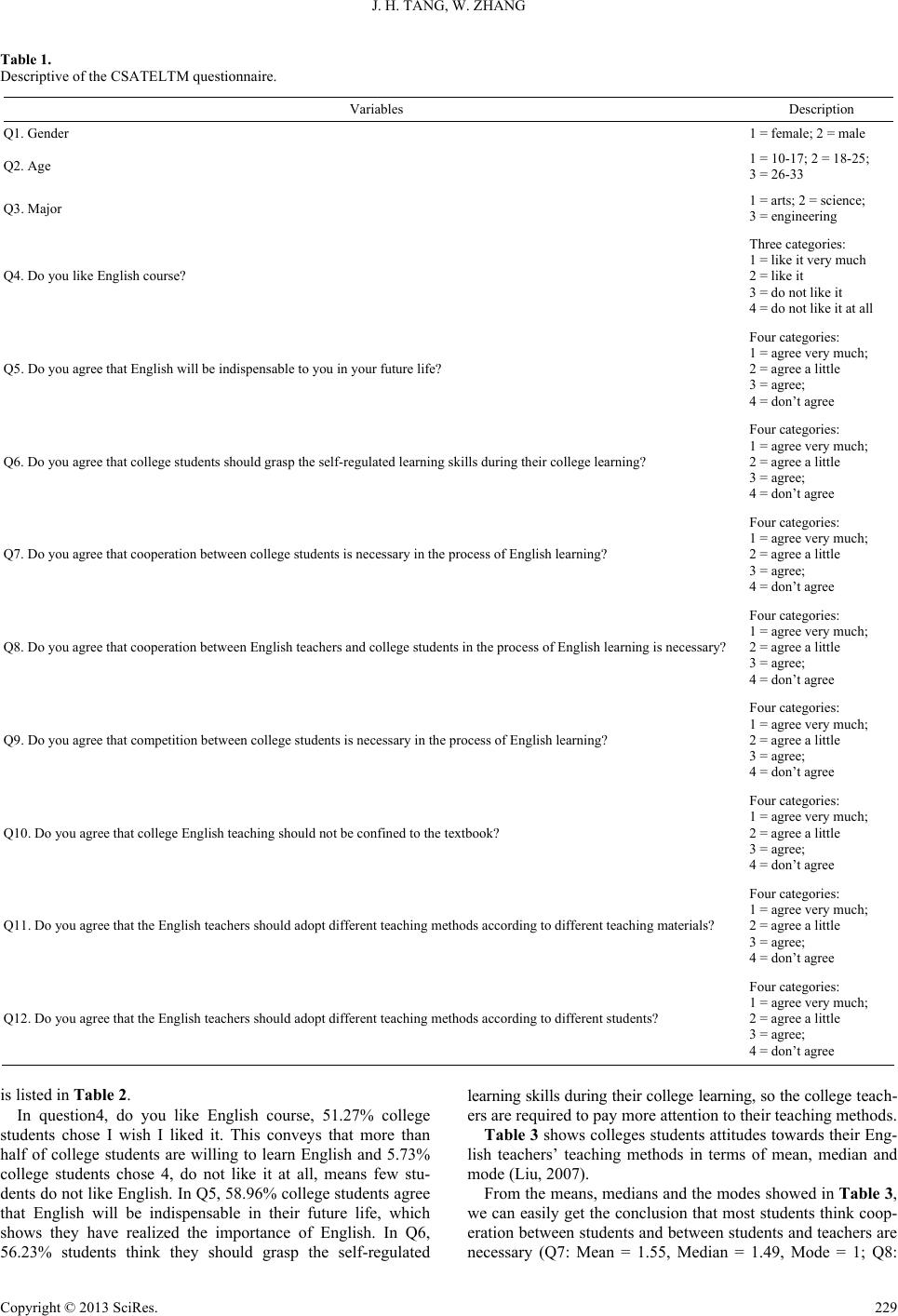 J. H. TANG, W. ZHANG Copyright © 2013 SciRes. 229 Table 1. Descriptive of the CSATELTM questionnaire. Variables Description Q1. Gender 1 = female; 2 = male Q2. Age 1 = 10-17; 2 = 18-25; 3 = 26-33 Q3. Major 1 = arts; 2 = science; 3 = engineering Q4. Do you like English course? Three categories: 1 = like it very much 2 = like it 3 = do not like it 4 = do not like it at all Q5. Do you agree that English will be indispensable to you in your future life? Four categories: 1 = agree very much; 2 = agree a little 3 = agree; 4 = don’t agree Q6. Do you agree that college students should grasp the self-regulated learning skills during their college learning? Four categories: 1 = agree very much; 2 = agree a little 3 = agree; 4 = don’t agree Q7. Do you agree that cooperation between college students is necessary in the process of English learning? Four categories: 1 = agree very much; 2 = agree a little 3 = agree; 4 = don’t agree Q8. Do you agree that cooperation between English teachers and college students in the process of English learning is necessary? Four categories: 1 = agree very much; 2 = agree a little 3 = agree; 4 = don’t agree Q9. Do you agree that competition between college students is necessary in the process of English learning? Four categories: 1 = agree very much; 2 = agree a little 3 = agree; 4 = don’t agree Q10. Do you agree that college English teaching should not be confined to the textbook? Four categories: 1 = agree very much; 2 = agree a little 3 = agree; 4 = don’t agree Q11. Do you agree that the English teachers should adopt different teaching methods according to different teaching materials? Four categories: 1 = agree very much; 2 = agree a little 3 = agree; 4 = don’t agree Q12. Do you agree that the English teachers should adopt different teaching methods according to different students? Four categories: 1 = agree very much; 2 = agree a little 3 = agree; 4 = don’t agree is listed in Table 2. In question4, do you like English course, 51.27% college students chose I wish I liked it. This conveys that more than half of college students are willing to learn English and 5.73% college students chose 4, do not like it at all, means few stu- dents do not like English. In Q5, 58.96% college students agree that English will be indispensable in their future life, which shows they have realized the importance of English. In Q6, 56.23% students think they should grasp the self-regulated learning skills during their college learning, so the college teach- ers are required to pay more attention to their teaching methods. Table 3 shows colleges students attitudes towards their Eng- lish teachers’ teaching methods in terms of mean, median and mode (Liu, 2007). From the means, medians and the modes showed in Table 3, we can easily get the conclusion that most students think coop- eration between students and between students and teachers are necessary (Q7: Mean = 1.55, Median = 1.49, Mode = 1; Q8: 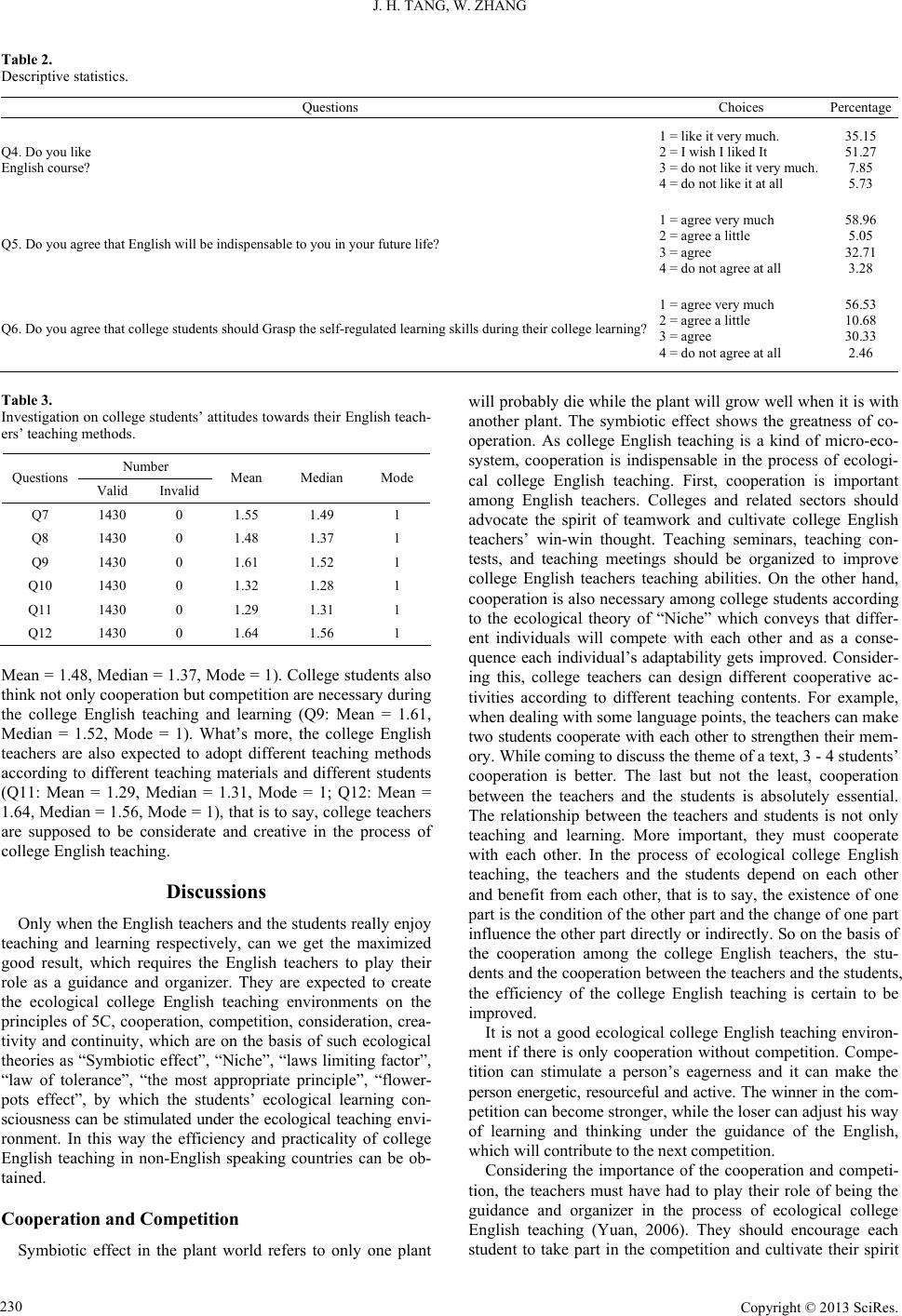 J. H. TANG, W. ZHANG Copyright © 2013 SciRes. 230 Table 2. Descriptive statistics. Questions Choices Percentage Q4. Do you like English course? 1 = like it very much. 2 = I wish I liked It 3 = do not like it very much. 4 = do not like it at all 35.15 51.27 7.85 5.73 Q5. Do you agree that English will be indispensable to you in your future life? 1 = agree very much 2 = agree a little 3 = agree 4 = do not agree at all 58.96 5.05 32.71 3.28 Q6. Do you agree that college students should Grasp the self-regulated learning skills during their college learning? 1 = agree very much 2 = agree a little 3 = agree 4 = do not agree at all 56.53 10.68 30.33 2.46 Table 3. Investigation on college students’ attitudes towards their English teach- ers’ teaching methods. Number Questions Valid Invalid Mean Median Mode Q7 1430 0 1.55 1.49 1 Q8 1430 0 1.48 1.37 1 Q9 1430 0 1.61 1.52 1 Q10 1430 0 1.32 1.28 1 Q11 1430 0 1.29 1.31 1 Q12 1430 0 1.64 1.56 1 Mean = 1.48, Median = 1.37, Mode = 1). College students also think not only cooperation but competition are necessary during the college English teaching and learning (Q9: Mean = 1.61, Median = 1.52, Mode = 1). What’s more, the college English teachers are also expected to adopt different teaching methods according to different teaching materials and different students (Q11: Mean = 1.29, Median = 1.31, Mode = 1; Q12: Mean = 1.64, Median = 1.56, Mode = 1), that is to say, college teachers are supposed to be considerate and creative in the process of college English teaching. Discussions Only when the English teachers and the students really enjoy teaching and learning respectively, can we get the maximized good result, which requires the English teachers to play their role as a guidance and organizer. They are expected to create the ecological college English teaching environments on the principles of 5C, cooperation, competition, consideration, crea- tivity and continuity, which are on the basis of such ecological theories as “Symbiotic effect”, “Niche”, “laws limiting factor”, “law of tolerance”, “the most appropriate principle”, “flower- pots effect”, by which the students’ ecological learning con- sciousness can be stimulated under the ecological teaching envi- ronment. In this way the efficiency and practicality of college English teaching in non-English speaking countries can be ob- tained. Cooperation and Competition Symbiotic effect in the plant world refers to only one plant will probably die while the plant will grow well when it is with another plant. The symbiotic effect shows the greatness of co- operation. As college English teaching is a kind of micro-eco- system, cooperation is indispensable in the process of ecologi- cal college English teaching. First, cooperation is important among English teachers. Colleges and related sectors should advocate the spirit of teamwork and cultivate college English teachers’ win-win thought. Teaching seminars, teaching con- tests, and teaching meetings should be organized to improve college English teachers teaching abilities. On the other hand, cooperation is also necessary among college students according to the ecological theory of “Niche” which conveys that differ- ent individuals will compete with each other and as a conse- quence each individual’s adaptability gets improved. Consider- ing this, college teachers can design different cooperative ac- tivities according to different teaching contents. For example, when dealing with some language points, the teachers can make two students cooperate with each other to strengthen their mem- ory. While coming to discuss the theme of a text, 3 - 4 students’ cooperation is better. The last but not the least, cooperation between the teachers and the students is absolutely essential. The relationship between the teachers and students is not only teaching and learning. More important, they must cooperate with each other. In the process of ecological college English teaching, the teachers and the students depend on each other and benefit from each other, that is to say, the existence of one part is the condition of the other part and the change of one part influence the other part directly or indirectly. So on the basis of the cooperation among the college English teachers, the stu- dents and the cooperation between the teachers and the students, the efficiency of the college English teaching is certain to be improved. It is not a good ecological college English teaching environ- ment if there is only cooperation without competition. Compe- tition can stimulate a person’s eagerness and it can make the person energetic, resourceful and active. The winner in the com- petition can become stronger, while the loser can adjust his way of learning and thinking under the guidance of the English, which will contribute to the next competition. Considering the importance of the cooperation and competi- tion, the teachers must have had to play their role of being the guidance and organizer in the process of ecological college English teaching (Yuan, 2006). They should encourage each student to take part in the competition and cultivate their spirit 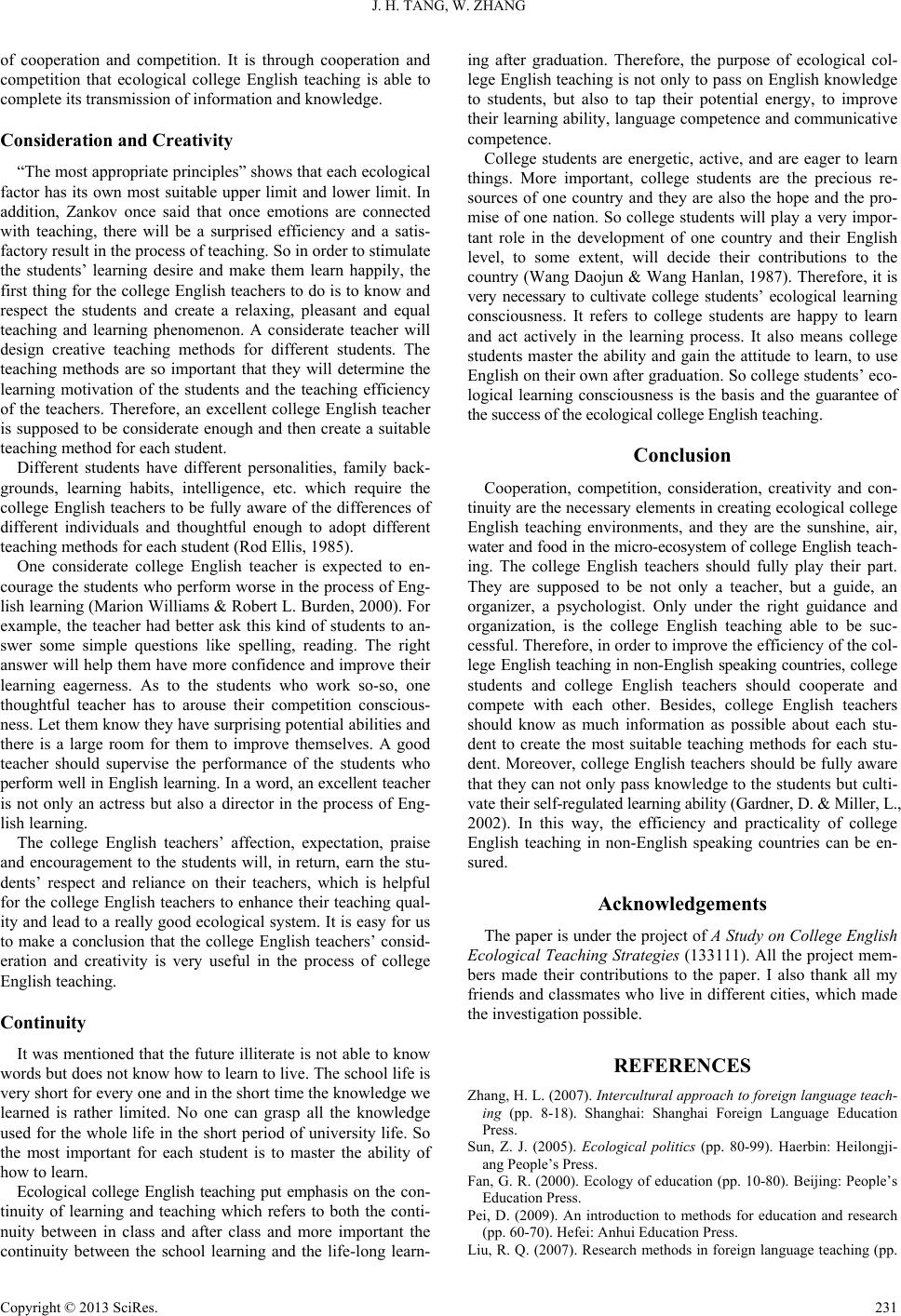 J. H. TANG, W. ZHANG Copyright © 2013 SciRes. 231 of cooperation and competition. It is through cooperation and competition that ecological college English teaching is able to complete its transmission of information and knowledge. Consideration and Creativity “The most appropriate principles” shows that each ecological factor has its own most suitable upper limit and lower limit. In addition, Zankov once said that once emotions are connected with teaching, there will be a surprised efficiency and a satis- factory result in the process of teaching. So in order to stimulate the students’ learning desire and make them learn happily, the first thing for the college English teachers to do is to know and respect the students and create a relaxing, pleasant and equal teaching and learning phenomenon. A considerate teacher will design creative teaching methods for different students. The teaching methods are so important that they will determine the learning motivation of the students and the teaching efficiency of the teachers. Therefore, an excellent college English teacher is supposed to be considerate enough and then create a suitable teaching method for each student. Different students have different personalities, family back- grounds, learning habits, intelligence, etc. which require the college English teachers to be fully aware of the differences of different individuals and thoughtful enough to adopt different teaching methods for each student (Rod Ellis, 1985). One considerate college English teacher is expected to en- courage the students who perform worse in the process of Eng- lish learning (Marion Williams & Robert L. Burden, 2000). For example, the teacher had better ask this kind of students to an- swer some simple questions like spelling, reading. The right answer will help them have more confidence and improve their learning eagerness. As to the students who work so-so, one thoughtful teacher has to arouse their competition conscious- ness. Let them know they have surprising potential abilities and there is a large room for them to improve themselves. A good teacher should supervise the performance of the students who perform well in English learning. In a word, an excellent teacher is not only an actress but also a director in the process of Eng- lish learning. The college English teachers’ affection, expectation, praise and encouragement to the students will, in return, earn the stu- dents’ respect and reliance on their teachers, which is helpful for the college English teachers to enhance their teaching qual- ity and lead to a really good ecological system. It is easy for us to make a conclusion that the college English teachers’ consid- eration and creativity is very useful in the process of college English teaching. Continuity It was mentioned that the future illiterate is not able to know words but does not know how to learn to live. The school life is very short for every one and in the short time the knowledge we learned is rather limited. No one can grasp all the knowledge used for the whole life in the short period of university life. So the most important for each student is to master the ability of how to learn. Ecological college English teaching put emphasis on the con- tinuity of learning and teaching which refers to both the conti- nuity between in class and after class and more important the continuity between the school learning and the life-long learn- ing after graduation. Therefore, the purpose of ecological col- lege English teaching is not only to pass on English knowledge to students, but also to tap their potential energy, to improve their learning ability, language competence and communicative competence. College students are energetic, active, and are eager to learn things. More important, college students are the precious re- sources of one country and they are also the hope and the pro- mise of one nation. So college students will play a very impor- tant role in the development of one country and their English level, to some extent, will decide their contributions to the country (Wang Daojun & Wang Hanlan, 1987). Therefore, it is very necessary to cultivate college students’ ecological learning consciousness. It refers to college students are happy to learn and act actively in the learning process. It also means college students master the ability and gain the attitude to learn, to use English on their own after graduation. So college students’ eco- logical learning consciousness is the basis and the guarantee of the success of the ecological college English teaching. Conclusion Cooperation, competition, consideration, creativity and con- tinuity are the necessary elements in creating ecological college English teaching environments, and they are the sunshine, air, water and food in the micro-ecosystem of college English teach- ing. The college English teachers should fully play their part. They are supposed to be not only a teacher, but a guide, an organizer, a psychologist. Only under the right guidance and organization, is the college English teaching able to be suc- cessful. Therefore, in order to improve the efficiency of the col- lege English teaching in non-English speaking countries, college students and college English teachers should cooperate and compete with each other. Besides, college English teachers should know as much information as possible about each stu- dent to create the most suitable teaching methods for each stu- dent. Moreover, college English teachers should be fully aware that they can not only pass knowledge to the students but culti- vate their self-regulated learning ability (Gardner, D. & Miller, L., 2002). In this way, the efficiency and practicality of college English teaching in non-English speaking countries can be en- sured. Acknowledgements The paper is under the project of A Study on College English Ecological Teaching Strategies (133111). All the project mem- bers made their contributions to the paper. I also thank all my friends and classmates who live in different cities, which made the investigation possible. REFERENCES Zhang, H. L. (2007). Intercultural approach to foreign language teach- ing (pp. 8-18). Shanghai: Shanghai Foreign Language Education Press. Sun, Z. J. (2005). Ecological politics (pp. 80-99). Haerbin: Heilongji- ang People’s Press. Fan, G. R. (2000). Ecology of education (pp. 10-80). Beijing: People’s Education Press. Pei, D. (2009). An introduction to methods for education and research (pp. 60-70). Hefei: Anhui Education Press. Liu, R. Q. (2007). Research methods in foreign language teaching (pp. 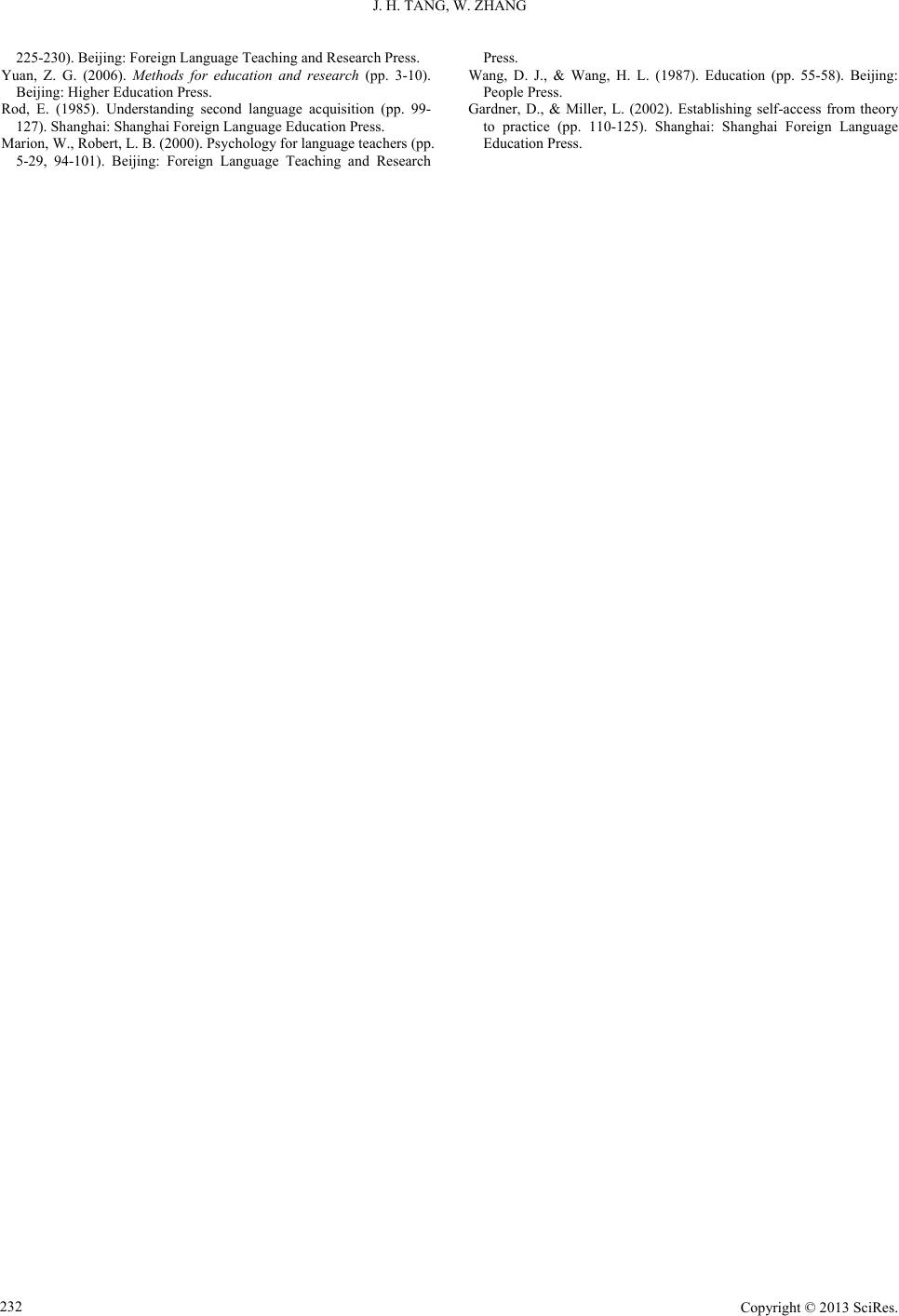 J. H. TANG, W. ZHANG Copyright © 2013 SciRes. 232 225-230). Beijing: Foreign Language Teaching and Research Press. Yuan, Z. G. (2006). Methods for education and research (pp. 3-10). Beijing: Higher Education Press. Rod, E. (1985). Understanding second language acquisition (pp. 99- 127). Shanghai: Shanghai Foreign Language Education Press. Marion, W., Robert, L. B. (2000). Psychology for language teachers (pp. 5-29, 94-101). Beijing: Foreign Language Teaching and Research Press. Wang, D. J., & Wang, H. L. (1987). Education (pp. 55-58). Beijing: People Press. Gardner, D., & Miller, L. (2002). Establishing self-access from theory to practice (pp. 110-125). Shanghai: Shanghai Foreign Language Education Press. |

